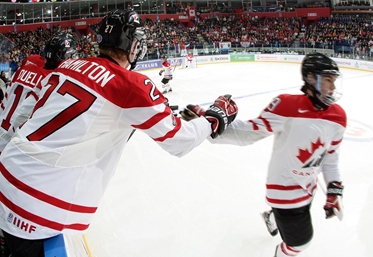Do tighter games help CAN?
Do tighter games help CAN?
What does goal difference say about Canada's chances?

 Canada scored 21 goals and allowed eight prior to the semi-finals at the 2013 IIHF Ice Hockey U20 World Championship. Photo: Andre Ringuette / HHOF-IIHF Images.
Canada scored 21 goals and allowed eight prior to the semi-finals at the 2013 IIHF Ice Hockey U20 World Championship. Photo: Andre Ringuette / HHOF-IIHF Images.
Since the IIHF introduced the playoff system at the World Juniors in 1996, Canada has advanced to the semi-finals 17 times – including this year. (The lone exception was 1998, when Canada lost 2-1 to Russia in the quarter-finals on Maxim Afinogenov’s overtime goal.) Only in four cases has Canada been obliged to win a quarter-final to advance (1999, 2001, 2002, 2011).
Unsurprisingly, Canada has recorded a positive goal difference at each and every one of these tournaments heading into the semi-finals. As the statistics bear out, the Canadians are highly consistent through the round-robin and quarter-finals (when applicable), whether or not they claim the ultimate prize in any given year.
Let’s break it down.
This year, the team’s goal difference is +13 (21-8) so far. Its fate is yet to be determined
In seven cases since 1996, the Canadians have gone on to win gold. Their average goal difference prior to the semi-finals has been +17.6.
In nine cases since 1996, the Canadians haven’t won gold. Their average goal difference prior to the semi-finals has been +18.11.
Overall, Canada’s average goal difference prior to the semi-finals has been +17.19.
Does this mean that Canadian fans should be concerned about their team performing below its usual standard thus far?
Not at all.
In five out of the seven cases where Canada has won gold, they have recorded average goal differences that were lower than the overall average of +17.19: 1996 (+15), 1997 (+11), 2006 (+10), 2007 (+10), and 2008 (+10).
This suggests that Canada generally is more likely to win gold when it is challenged prior to the semi-finals and finals – forced to play in tighter games – instead of simply romping to victory.
So Canadian fans can be optimistic as their team prepares to meet the United States in Thursday’s semi-finals.
Here is the data regarding Canada’s goal difference in World Juniors dating back to 1996. Years with two asterisks are those in which Canada won gold.
2013: 21-8 = +13
2012: 26-5 = +21
2011: 32-13 (incl. QF win vs. Switzerland) = +19
2010: 35-6 = +29
2009: 36-6 = +30 **
2008: 16-7 = +9 **
2007: 14-4 = +10 **
2006: 16-6 = +10 **
2005: 32-5 = +27 **
2004: 25-4 = +21
2003: 21-6 = +15
2002: 35-9 (incl. QF win vs. Sweden) = +26
2001: 22-10 (incl. QF win vs. US) = +12
2000: 17-8 = +9
1999: 22-11 (incl. QF win vs. Kazakhstan) = +11
1998: N/A (QF loss to Russia)
1997: 22-11 = +11 **
1996: 19-4 = +15 **
Back to Overview





















































